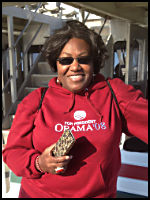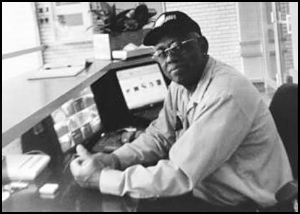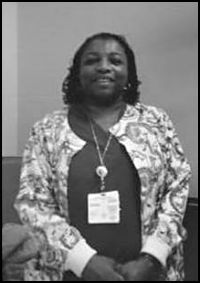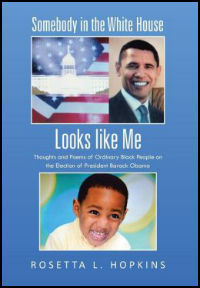Nurse and Author, Rosetta Hopkins

Rosetta L. Hopkins, a registered nurse in Chicago, wanted to know, so she interviewed Black skilled and unskilled workers, professionals, and retirees of all ages and from different parts of the country. Their varied responses range from predictable to surprising. She compiled all of them - some brief, others more contemplative - in her new book, "Somebody in the White House Looks Like Me."
I think it would be fair to assume that Rosetta Hopkins might consider herself an “ordinary person�. But Rosetta Hopkins set out to capture something extraordinary when she took it upon herself to interview everyday people, Black Americans, about the election of the first Black American President. While some of the answers to Rosetta’s question may have been understandably expected, Rosetta discovered something, for herself, about race and this this United States of America that she calls home.
DR: I just want to start our conversation by acknowledging that this is quite an opportunity, to talk to you about your book in light of our current social climate as it pertains to race, against the backdrop of the first Black American President.
RH: We kind of put race on the back shelf for a moment...
DR: Yeah, and I think that as a nation we refuse to confront that we don't want to talk about it. Having said that, can you share with me a bit about your book?
RH: Someone in the Whitehouse Looks Like Me is a compilation of a number of interviews that I did around the country, asking ordinary Black people to share how they felt about the election of the first Black President. It was something that I think most of us never thought we would see in our lifetime.
It was interesting because initially it was only Black celebrities that were being asked by the media about how they felt. Ordinary people were not in the mix. I thought there was something unique that ordinary people would have to say.
I asked them three simple questions. One question was,
"How did you feel and what were you thinking of when Barack Obama was elected President"?
The interviews were quite interesting. Most people were very elated. Their self-esteem had increased. They felt very proud. They felt that their voice would now be heard in government and that things would get better in terms of their housing and employment or how they had been treated in this country. Black people are treated like second-class citizens. Even today. That experience came through in a lot of the interviews.
The second question was,
"Why do you feel the need to participate in the inauguration?"
A lot of people still didn't believe it. They felt something might happen to President-elect Obama before he got sworn in and I think that is why there was this huge participation in the first inauguration.
I had the opportunity to be at the inaugural ball in Chicago and ask people why they felt the need to be there. There were about 500 people at this ball.
The final question was,
"What changes do you expect to see at the end of his first four years that would impact your life?"
In the course of answering these questions, many of the interviewees went back and reflected on their backgrounds and what they have gone through in this country and how they feel as Black people living in this country and dealing with discrimination and inequality. They talked about things that they hoped would change now that the country had set aside race as a factor in electing a President and how they hoped things would get better, not only for them but for their children.
They expected to see better education for their kids. They expected to see better employment. They expected to see better and safer neighborhoods. Basically, they expected to see what everybody else wanted to see and expected in 2009.
DR: What is it that you learned overall as a result of conducting these interviews?
RH: Well , I gained a better understanding of why Rosa Parks was so important. I read history about Rosa Parks and Martin Luther King. I understood about the bus seating and not getting up but I didn't understand that was something prevalent throughout the south - that Blacks had to get up when White people didn't have a seat on the bus.
DR: So you are saying that you weren't aware that that went on?
RH: No! I didn't grow up in that era. I was born in Chicago and that didn't exist in Chicago.
DR: Right. I was born in Wisconsin but I remember...Do you mind if I ask how old you are?
RH: Sixty-Three.
DR: Okay. That is just fascinating to me...
RH: So anyway, I understood better why that was such a monumental statement that she made in light of the situation in the south and why the bus strike was so important in giving The Civil Rights Movement a big thrust.
But in the process of all that was happening they went back to Blacks having to sit in the balconies in theaters (which I never had to do in Chicago) not being waited on in stores, not being able to go to swimming pools. I never experienced that
That was all a learning factor for me in discussing with them. The older they were, the further they went back. I think the oldest interviewee was ninety-three years old. He said that he was glad he had lived to see this happen.
It was an interesting process. I let people say what they wanted to say. I didn't guide the answers. I didn't change or modify the answers at all.
DR: I remember thinking, and I got into conversations with friends, mostly white friend that "Yes, we elected the first Black President" but that is all I saw as far as an equality accomplishment for Black Americans. I didn't think it meant that we had arrived anywhere. And I understand how people would think that on certain levels their lives would change, but, call me cynical, I did not see it that way at all. I thought, "Well we have done this and there is still a MAJOR conversation about race that has yet to happen in this country.
What did you think about this while you were working on "Someone in the Whitehouse Looks Like Me"?
RH: I think I kind of had the same sentiment. The glass ceiling being broken, that you could aspire to be President and that you could have some input into government, was an important thing for people. Obama hadn't served any time in office yet and people looked at the presidency...the fact that you had a Black President with a family just elevated the whole race to a higher level of respectability as opposed to the stereotypes that were flying around the country – our children are criminals, everyone is low class, we have very little education. So you have a President who is a Harvard grad, who is married, who is a devoted father? That showed another side to America. In essence it kind of countered some of the stereo types of Black people and showed them that there are Black people who do live normal lives.
Interview Excerpts from Somebody in the White House Looks Like Me
Jerry Taylor, sixty-five years old, a black man and a condominium engineer, resides in Chicago, Illinois.
"I was glad 'cause there is a future for young black Americans. And most of all, I was thrilled to see the whole world was excited and accepted him as being an American Black. That's my whole feeling right there. That part, that's more than any of it -- that the whole world accepted it - and I was happy."
Cathy Whitehead, forty-seven years old, a Registered Nurse, and mother who resides in Chicago, Illinois.
"I was not shocked. I just had a feeling he was going to do it, because it wasn't a matter of economics. So, that's why I looked into the crowds on TV and saw all the people in Grant Park; there was a variety of color, race and creed.
So, how did that make me feel? It made me feel like America finally made it. For once, we put color and race to the side and came together as one. I was shocked and amazed we were able to pull it off. I was very delighted, but I was sad for those who weren't around to share it, 'cause that would have knocked my grandfather's boots off."Cathy concluded with a healthy chuckle.
Click here to learn more about Somebody in the White House Looks Like Me and to purchase the book.
DR: Yeah...I am curious what you think now about what some of those people that you interviewed would think about what they originally said, given the current social climate - post Supreme Court voter registration decision and after the George Zimmerman verdict and the movements that have sprouted up around the country as a result? What do you think your interviewees would think now about what they said in January 2009?
RH: From listening and talking to people and getting the sentiment of people in Chicago, I think there is a little disappointment. There is a little anger and an outrage that this could be happening at this time. Many people have called it a lynching, not that Zimmerman was lynched but that a White man could kill a Black boy and then fall back on the stand your ground law when he was the aggressor...
DR: It feels very much like modern day lynch mob mentality. Like it's open season on Black men...
RH: But that is how White people see it Dana. And I doubt that you would be able to convince any Black person in the country that Zimmerman was in his rightful stance to say that he was standing his ground.
I think the Presidents speech was so important especially the point that he brought up about whether or not Trayvon Martin would have been given the benefit of the doubt had he decided to stand his ground against George Zimmerman aggressively pursuing him in the first place.
DR: Yes. And would people feel the same way about Stand Your Ground Laws if Trayvon Martin had chosen to defend himself according to Florida law?
RH: Exactly. I think he would have been locked up and labeled a murderer.
DR: And if the Stand Your Ground Laws were, and let's just be honest that there are one set of laws for White people and another set of laws for Black men in particular, and if the law was equal and fair, I guess what I heard in what the President was saying, is that there probably wouldn't be a lot of White people who would be comfortable with young Black men turning a gun on and shooting White people simply because they felt threatened. Because I will venture to say that there are many Black men who very often feel threatened by White men (especially in the south) who suspect them unfairly of potentially committing crimes. I mean what kind of support would the law be getting in Florida if Black men were treated equally under that law.
RH: The President put that out there so that people could think about the law in those terms. I mean technically based on the history of the south, a Black man has the right to feel threatened every time they see a White man in a robe...
The world is very divided. It became very clear during the past election when Republicans and Tea Party members thought that only White people could elect the President and America spoke up and said, "We are going to elect Barack Obama again".
We are a diverse world with many people of different cultures and races and America has come to exemplify that.
DR: And what is interesting about that is I don't think that Black Americans would have elected Barack Obama just because he was Black, anymore than White America would have elected him because he was Black. He was in fact the best man for the job.
RH: I agree.
DR: In that respect I feel a little bit of optimism. He was the best guy for the job and his color was not the ultimate determining factor.
RH: I agree. There were Blacks that ran before him that did not galvanize the Black vote. People forget about that. They voted for Clinton because they felt that he was the best man for the job even though there was a Black man in the race.
DR: There is a poem in the book that got my attention,
The Great Mistake: Racism masquerading as fate to make us believe it has been erased in one day. What a great mistake...
It goes on later on:
What a great mistake we all would make to assume one inaugural day could make all racism go away. Reverse the Civil Rights law some say ‘cause a Black Man was elected President today. What's next? Do you know? Maybe reverse our right to vote? What a great mistake we would make to undo our Civil Rights of today.
What do you think about that poem relative to current events?
RH: I think it is totally reflective of what happened during the last presidential election and people falsely feeling that there was no longer a need for Affirmative Action, that there was no longer a need for Civil Rights because Obama had been elected President. Black people's right to vote had been secured but that only came about because of The Civil Rights Act. You could see that we were going backwards during the last election with all of the voter suppression. People were being challenged in the same ways that they were forty or fifty years ago.
DR: It is interesting Rosetta, I am thinking, and you correct me if I am wrong, that your notion of how the book would evolve was likely very different when you completed it than it is now. It almost feels like this poem is a little bit prophetic. Maybe initially the book was more a marking a great event and now it seems like somewhat of a call to action – certainly a wake-up call or an invitation to engage in a more serious or intentional conversation about race. What are your thoughts about that?
RH: You are absolutely right. The book was intended to mark the event and to record how ordinary people felt about President Obama being elected. Someone in the Whitehouse Looks Like Me was to create a forum for that and to leave something that we could look at years from now to remember how we felt about this moment in history. But then, as the book went on and as things went on, it did become something else. It is actually saying "take this event and take the opportunity that is created by having a Black President and stop playing the blame game and take advantage of the opportunities that are out there. The other thing it is, is a warning not to take for granted the ground that was taken through The Civil Rights Movement as if it could never be reversed or rescinded...
DR: Yup. Yup Boy, if there is anything to take away from this past summer it would be that...
Rosetta, ultimately what is the impact that you hope the book will have on our culture years from now?
RH: The one thing the book does is document a moment when we were all full of joy and excitement. It's a moment when we all came together. For a moment in time, race was not a factor. For a moment in time, we were all Americans. We may never have a moment like that again.
I think about the Tea Party. I think about John Boehner. I think about Republican obstructionists...I'm thinking that the title for my second book might be Sink the Ship to Kill The Captain.
You can't close the doors to people who want to rise inside of our system. Barack Obama reflects the possibility.
DR: A hundred years from now, what do you want to be remembered for?
RH: I want to be remembered for having left something positive that influenced and affected other people's lives and made them move forward and accomplish something beyond their present reality. That something I said or wrote or did might one day impact someone to make them want to strive to be better and erase the hopelessness that they may have, would be good.
We have to believe that things can get better and that things can improve. That is what the book is really about...
Thanks Rosetta!
SOMEBODY IN THE WHITE HOUSE LOOKS LIKE ME
In 2008, the United States made history when it elected the first African American to serve as its country's president. This was a momentous occasion for both black and white Americans. In Somebody in the White House Looks Like Me, author Rosetta L. Hopkins shares interviews of average people in the black community to reveal how they felt about the election of a black president and his inauguration and what their expectations of the new president-elect were at the time.
Ms. Hopkins interviewed ordinary black people ages sixteen to ninety-three of both sexes and from a broad occupational spectrum to capture their feelings and thoughts about the election of the first black president. Including original poetry and photos, Somebody in the White House Looks Like Me documents the interviewees' emotions of joy or disbelief as they discuss their recollections on the state of America today and in the past. Recording the silent and unheard voices of everyday black people whose opinions are often neglected, Somebody in the White House Looks Like Me recognizes that moment in time when the division among the races was minimized for a greater good.Click here to learn more about Somebody in the White House Looks Like Me and to purchase the book.



